Study Publications
New publication
Introduction Primary care interventions are often multicomponent, with several targets (eg, patients and healthcare professionals). Improving Primary Care After Stroke (IPCAS) is a novel primary care-based model of long-term stroke care involving a review of stroke-related needs, a self-management programme, a direct point of contact in general practice, enhanced communication between care services, and a directory of national and local community services, currently being evaluated in a cluster randomised controlled trial (RCT). Informed by Medical Research Council guidance for complex interventions and the Behaviour Change Consortium fidelity framework, this protocol outlines the process evaluation of IPCAS within this RCT. The process evaluation aimed to explore how the intervention was delivered in context and how participants engaged with the intervention.
Methods and analysis Mixed methods will be used: (1) design: intervention content will be compared with ‘usual care’; (2) training: intervention training sessions will be audio/video-recorded where feasible; (3) delivery: healthcare professional self-reports, audio recordings of intervention delivery and observations of My Life After Stroke course (10% of reviews and sessions) will be coded separately; semistructured interviews will be conducted with a purposive sample of healthcare professionals; (4) receipt and (5) enactment: where available, structured stroke review records will be analysed quantitatively; semistructured interviews will be conducted with a purposive sample of study participants. Self-reports, observations and audio/video recordings will be coded and scored using specifically developed checklists. Semistructured interviews will be analysed thematically. Data will be analysed iteratively, independent of primary endpoint analysis.
Aquino MRJR, Mullis R, Kreit E, Johnson V, Grant J, Lim L, Sutton S, Mant J (2020) Improving Primary Care After Stroke (IPCAS) randomised controlled trial: protocol for a multidimensional process evaluation. BMJ Open. 10:e036879
Paper published in BMC Family Practice
A paper focusing on using a checklist to facilitate management of long-term care needs after stroke has just been published in BMC Family Practice. This paper uses insights from focus groups and a feasibility study. It was concluded that the checklist is a potentially valuable tool to structure stroke reviews using a patient-centred approach.
A link to the full paper can be found here.
Read our review exploring why stroke survivors and carers feel abandoned
The article entitled: “Stroke survivors’ and informal caregivers’ experiences of primary care and community healthcare services – A systematic review and meta-ethnography” was recently published by PLOS ONE. The article was written by Dominika M Pindus, Ricky Mullis, Lisa Lim, Ian Wellwood, Viona Rundel, Noorazah Abd Aziz,and Jonathan Mant.
The study suggests that primary care and community health care interventions which focus on improving active follow-up and information provision to patients and caregivers, especially in the first year after stroke, could help improve patient self-management and increase stroke-specific health literacy.
You can find the full article published here.
Stroke survivors and caregivers feel abandoned by health services, study finds
A protocol for a scoping review, accepted for publication by BMJ Open
We are pleased to announce that the article entitled: “Primary care interventions and current service innovations in modifying long-term outcomes after stroke: a protocol for a scoping review” has now been accepted for publication by BMJ Open. The article was written by Dominika M Pindus, Lisa Lim, A Viona Rundel, Victoria Hobbs, Noorazah Abd Aziz, Ricky Mullis and Jonathan Mant. read more…
The 2nd European Stroke Organisation Conference 2016
Dr Dominika Pindus will be presenting two posters based on our systematic qualitative review findings at the ESOC event in Barcelona, 10-12 May 2016. These posters cover both stroke survivors’ and carers’ experiences and need for primary care and community health services.
